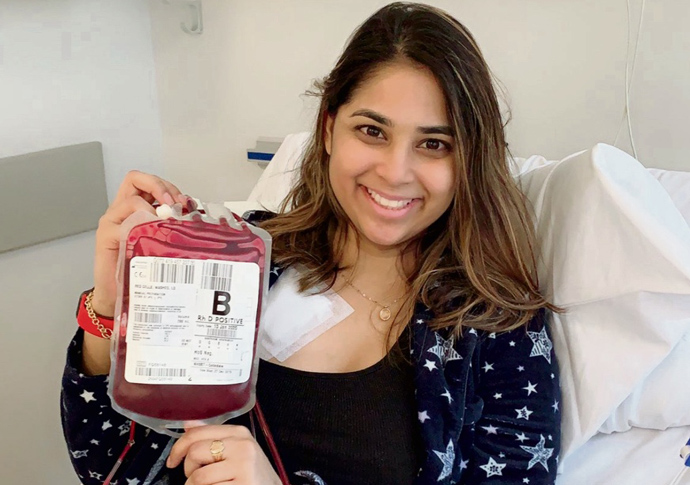Patient Roanna has key role in ‘gene-editing’ breakthrough
Futuristic treatment is set to be life-changing for those who suffer from debilitating condition
Friday, 16th August 2024 — By Tom Foot

Roanna Maharaj, who has suffered from Thalassaemia since a young age
A WHITTINGTON patient who has been having treatment for a debilitating condition since she was diagnosed as a baby has been instrumental in getting a futuristic treatment approved on the NHS for the first time.
Roanna Maharaj spoke this week about how Thalassaemia had affected her life and what the new “gene-editing” therapy would mean to her and thousands of other patients across the country.
“It has been the fight of our lives,” she told the Tribune.
The 35-year-old told how she regularly spends eight hours a day in the Highgate hospital having gruelling blood transfusions, has had to walk with a Zimmer frame due to the symptoms of the condition, and is taking 50-60 pills a day. Few patients live into their 40s.
The breakthrough treatment – which involves scientists “snipping” DNA strands and genetically modifying cells – means the vast majority of patients with the condition will live out their lives free from blood transfusions.
Ms Maharaj was a key player in a small group, backed by Whittington senior consultants, that convinced NICE (National Institute for Health and Care Excellence) to approve the new treatment last month after a five-year campaign.
Stem cells are removed from the patient’s bone marrow and “edited” in a laboratory by scientists. The modified cells are infused back into the patient.
It is the first time a gene-editing therapy has been made available to NHS patients with any condition.
Ms Maharaj is one of around 200 Thalassaemia patients at the Whittington – but the decision is expected to provide a new lease of life to thousands of patients across the country.
“I have had Transfusion Dependent Thalassaemia since I was four months old, and now I’m 35,” she said.
“Usually I have to go to the Whittington every two weeks, but often it has been every four to seven days.
“It is a very challenging and debilitating condition. It causes pain and there are issues with fertility. You get osteoporosis. You have to have IV medication, where a needle breaks the skin. You are so tied down to the medication, I have to take 50/60 tablets a day.
“Living with this condition is a full-time job. It takes two hours to take in one blood unit, often I will be in for eight hours. We worked out that it was about 66 days per year that go just through routine management of it. It is such a burden on patients.”
Thalassaemia affects the production of haemoglobin, which is used by red blood cells to carry oxygen around the body.
The disease evolved as a response to malaria and is mainly found in people of Mediterranean, Middle Eastern, Asian and South East Asian heritage – with Bangladeshi, Indian and Pakistani people worst affected.
The condition is inherited from both parents who often carry the genetic trait unknowingly and do not realise until the woman is tested for the first time during pregnancy.
“Parents are then faced with one of the most difficult decisions they will ever have to make in their lives,” Ms Maharaj said.
“The question they are asked is, ‘Would you like to continue with the pregnancy?’”
Several Whittington patients took part in trials of the new treatment, called Casgevy, with 93 per cent of them not needing to have transfusions anymore and “several showing signs of being cured of the condition”.
But even opting for the new treatment will amount to a “very big decision” for many people who will be risking other serious illnesses and complications in a bid to escape their current ordeal.
Consultant Haematologist at the Whittington, Dr Ryan Mullally, told the New Journal: “You have to go into hospital for two weeks. There is heavy chemo and radiotherapy. The side-effects are significant.
“There is even a chance of death. The patient has to weigh up the risks to the benefit.”
He said the impact of Ms Maharaj’s evidence to the committee and the work of the UK Thalassaemia Society “could not be overestimated”.
Whittington consultant Dr Emma Drasar was also part of a small team that presented evidence to NICE’s approval panel, showing how average life expectancies changed dramatically for people from more deprived backgrounds and different ethnicities.
“I don’t think NICE realised how difficult it was for the patients to be going through these transfusions,” said Ms Maharaj, who lives in Haringey and has three degrees including one in psychology.
“For most of our lives we have had no option, and no one has been talking about a cure. It is going to take time, but things are starting to change.”